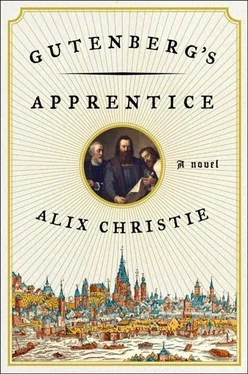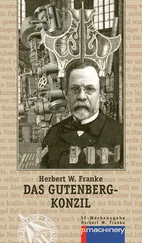By rights the master should have been there too, carousing with his workmen. There never was an Elder like him, who would roll his sleeves up, curse and joke and wrestle with the ores and metals right beside them. Damn him. When it most counted, he was gone. If he could just have been more honest, shown a little trust. But no.
“What will you do?” Mentelin asked low in Peter’s ear.
He looked into those green eyes. “I always prayed I would not have to choose.” He felt a shiver in his soul to have to walk on now alone.
The boat was bobbing with the motion of the river and the pounding of the drunks. Mentelin was nodding with a look of great concern when Peter felt a hand upon his back. He turned and saw the broad, inebriated face of Petrus Heilant. He had to laugh. “I should have known I’d find you here,” he told the man. The scribe was always halfway in his sight, some kind of strange dark angel at his side. “We’ve nothing to confess,” he drily said, “though you are welcome to join in the celebration.”
Heilant looked beyond him toward the crew, his eyes unfocused, and began to speak in a slurred voice. “Play now,” he seemed to say, and then “repent.” Whatever else he said was swallowed in the din. Peter put a hand up to his ear, and Heilant tugged him by the elbow. Reluctantly the printer rose and followed him across the gangplank to a quieter place along the quay.
“A clever game you played,” his former schoolmate said. His cheeks were red, his breath was labored; he had grown stout. “All along I knew you were mixed up in this.” In his tone there was a note almost of reproach, as if some part of Heilant wished he’d been invited to share in that secret.
“I followed my own conscience,” Peter said.
“Still. This Bible that you peddle…” Heilant’s eyes were inky dots, unreadable.
Peter did not answer. The skies were blazing with bright stars; the man before him was a clerk, a little man with great delusions of his power.
“I doubt His Grace will let it go for long.”
“He used it for his letters — and would have used it for his missal.”
“ His letters and his missal. That’s the point.”
“The Bible isn’t his.” It wasn’t any bishop’s, any pope’s — but God’s. “Dietrich will have no choice,” Peter continued calmly. “When it is praised by cardinals and even by the kaiser, he will find he must embrace it.”
Then it was Heilant who fell mute, silenced by the truth of Gutenberg’s maneuver.
Peter watched the human tide surge by, some to the drinking ships, others to the gaming houses and the brothels, those ordinary workers seeking out their momentary joy. There but for God’s grace, he thought suddenly, go I.
“It cannot stay this way.” He rounded on the archbishop’s clerk. “You cannot hold the world — you cannot even hold the Bible now — in chains.”
The drink made Heilant’s mocking smile more venomous, no doubt, than he intended. “A moment’s crisis, that is all.” He shrugged. “You fail to see that all are lifted by the tide.”
“Your kind are lifted, but not mine.”
Heilant’s face tightened. “Providence decides.”
Peter smiled. “The proof has already arrived.”
“You always did think that you had some private pact with God,” the clerk said with an ugly look.
Of course. How could he not? How could he — Peter Schoeffer, shepherd’s son — have understood his own life otherwise? The world just opened, larger, ever larger, his life proceeding and unfurling year by year: from field to town, from classroom to academy to abbey, the walls of each succeeding room more open and expansive than the one that came before. Until at last he stood in this cathedral with his arms outstretched, holding this extraordinary book.

PETER SCHOEFFER went on to become the world’s first major printer, producing nearly three hundred volumes through the firm of Fust & Schoeffer, including the 1457 Mainz Psalter, widely considered the most beautiful book ever printed. Upon Fust’s death in 1466, Peter married his daughter, Christina, establishing a printing dynasty that spanned four generations. He invented the business of publishing and founded the event known today as the Frankfurt Book Fair, and died in 1503 at the ripe age of nearly eighty.
JOHANN GENSFLEISCH, known as Gutenberg, was immediately recognized as the inventor of printing with movable type. Though he never signed a single printed book, the success of the Biblia latina led to another Bible commission from the bishop of Bamberg and to Gutenberg’s appointment in 1465 to the court of the new archbishop of Mainz, Dietrich’s successor. Until his death in 1468, aged about seventy, he is thought to have produced many papal bulls, calendars, and letters of indulgence in consortium with printers including Heinrich Keffer and Berthold Ruppel. His last work was a new type for a religious encyclopedia, the Catholicon of Balbus, which it is believed other printers brought to press after his death.
JOHANN FUST prospered as a merchant and publisher, selling the wares of Fust & Schoeffer across western Europe after his partnership with Gutenberg was dissolved in November 1455. While showing a printed Bible in Paris in 1463, he was hounded out by scribes who accused the firm of undercutting normal prices. On a later business trip, he contracted the plague and died in Paris in 1466, aged about sixty-five. Several years later, Peter Schoeffer and Konrad Henkis, Grede’s second husband, donated a copy of the firm’s Letters of Jerome to the abbey of Saint-Victor in Paris, which pledged to say a mass in perpetuity for Fust.
JAKOB FUST was killed in battle in 1462, when Mainz’s feuding factions descended definitively into civil war. As Bürgermeiste r (mayor) he had led the city council in a losing fight over Dietrich’s successor as archbishop. The victor, Adolph of Nassau, swiftly turned the once-free city into a vassal of the archdiocese, stripping the guilds of power and the council of its sovereignty. Many, including the three men who made the first printed Bible, lost homes and businesses. Nassau’s orders were eventually rescinded, and Gutenberg honored as a member of his court, while Fust and Schoeffer reestablished their press at the Haus zum Iseneck on the Brand.
JOHANNES TRITHEMIUS published accounts of his conversations with Peter Schoeffer in two chronicles, the Chronicon Sponheimense of circa 1500 and the Annales Hirsaugienses of circa 1514. His work De Laude Scriptorum (In Praise of Scribes) was printed in Mainz in 1494, presumably by Peter Schoeffer or his son Johann.
POPE NICHOLAS v died in March 1455, and with him any hope for Crusade against the Muslim Turks. No army was ever raised, despite the vehement exhortations of Enea Silvio Piccolomini, the former secretary to Kaiser Friedrich III, who was named Pope Pius II in 1458.
The fall of Mainz pushed journeymen who trained in those two rival workshops out as refugees into the wider world. The craft of printing spread like wildfire: within a decade, it was being plied by Johann Mentelin and Heinrich Eggestein in Strassburg, Heinrich Keffer in Bamberg and then Basel, the Bechtermünzes in Eltville — then Johann Neumeister, Berthold Ruppel, Albrecht Pfister, Konrad Sweynheym, and others, the secret knowledge spreading from Germany to Italy and Switzerland and France. Printers set up shop in more than 250 cities between 1450 and 1500, a period known as the time of incunabula —the cradle years of printed books.
Читать дальше













